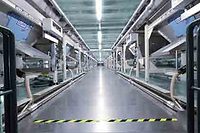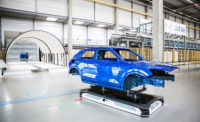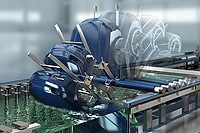The plant engineering company Dürr is building an entire paint shop for the successor model to the Volkswagen Crafter for Volkswagen Poznan Sp.o.o. The resource-saving Eco+Paintshop in Wrzesnia, Poland, will use exceptionally little water, energy and materials. It is one of the biggest projects in Dürr’s history.
As general contractor, Dürr is not only supplying the painting equipment, but also has the responsibility for the construction of the building. In terms of installation engineering, Dürr is supplying the dip tanks for the PT/ED area as well as one primer line, two base-coat and two top-coat lines with the associated spray booths, ovens, conveyor systems, exhaust air purification and work stations.
Starting with cataphoretic dip coating, sustainability plays a key role for Volkswagen. The energy saving and fail-safe cataphoretic dip coating solution EcoDC MACS will be used. This technology uses a modular anode control system to create a guided voltage or current profile parallel to the car body movement in the dip tank. This concept, combined with its innovative power electronics, provides precision current and voltage supply and has a positive effect on both energy demand and coating quality of the car body. The transport of the car bodies through the dip tanks is performed by one of the longest pendulum conveyor systems ever built.
There are 18 robots of the type EcoRS16 that will perform underbody coating and seam sealing, and 36 robots of the type EcoRP E and EcoRP L, each equipped with the high-speed rotary atomizer EcoBell3, perform the fully automatic interior and exterior painting in the primer line and the two base- and top-coating lines. The combination of EcoBell3 and color changer EcoLCC2 enables a color change in the basecoat area in less than 10 seconds using a push-out process in which the paint valve is closed prior to completing the painting process. The paint material still resident in the paint hose is pushed towards the atomizer using a solvent. The paint loss in a change of paint colors is between 10 and 15 ml.
To supply of standard colors, Volkswagen relies on the proven circulation technology while special colors are supplied by the flexible piggable special paint system EcoSupply P. Using pigging technology (pig = fitting body), the color is moved through the pig hoses without any residue. This is especially material and cost efficient.
Eight swing-arm robots of type EcoRP L053 paint the interior of the cargo space; this increases the flexibility of the production line. These robots are equipped with the material and time-saving atomizer EcoBell3 as well.
Overspray is separated by the energy-efficient paint booth system EcoDryScrubber. This dry separation of the overspray works without any water and chemicals. The spray booth can therefore be operated with up to 90% recirculated air. This reduces the effort for air conditioning and thereby reduces the energy demand in the spray booth by up to 60%.
The straight-through ovens are designed for complex body structures and low-exhaust gas temperatures. The exhaust air streams of all ovens are purified via the integrated thermal oxidiser unit Ecopure TAR with heat recovery. The exhaust air is then used again for heating the ovens.
Using the EcoDryScrubber with air re-circulation reduces the exhaust air volume of the spray booths. The remaining exhaust air is purified with the concentrator unit of Ecopure KPR. It is a very compact unit, as the upstream dry separation already concentrates and efficiently filters the exhaust air. The compact design decreases the investment costs for the exhaust air system by 60%. The energy requirements for exhaust air purification are reduced by the combination of EcoDryScrubber / Ecopure KPR by 80%, and solvent emissions are reduced by as much as 90%.
The Eco+Paintshop concept includes the exact coordination of building and installation engineering. An example is the use of high-bay warehouse technology instead of buffer tables. This minimizes the building area and gives the customer optional access to any car body.
The first VW Crafter vehicles will be delivered starting in the second half of 2016. Annual production capacity of up to 100,000 vehicles is planned by Volkswagen.





Report Abusive Comment